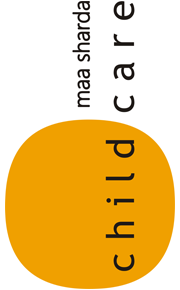 90996 08880, 90997 08880
90996 08880, 90997 08880 +91- 72 1110 3330
+91- 72 1110 3330 Make An Appointment
Make An Appointment maashardachildcare@gmail.com
maashardachildcare@gmail.com
The color, symbolizes the sun, the eternal source of energy. It spreads warmth, optimism, enlightenment. It is the liturgical color of deity Saraswati - the goddess of knowledge.
The shape, neither a perfect circle nor a perfect square, gives freedom from any fixed pattern of thoughts just like the mind and creativity of a child. It reflects eternal whole, infinity, unity, integrity & harmony.
The ' child' within, reflects our child centric philosophy; the universal expression to evolve and expand but keeping a child’s interests and wellbeing at the central place.
The name, "Maa Sharda;" is a mother with divinity, simplicity, purity, enlightenment and healing touch, accommodating all her children indifferently. This venture itself is an offering to her........
passing char to function in cpassing char to function in c
A very good reason for this is that it makes things easier if you want to make changes that will be reflected when you return to the function that created the instance of it. If you want to change value of that character inside a function, then you must pass a pointer to it, but there's no problem in accessing it like you do: if (*val == 'I') { *val = 'S'; } It's more about what does your function expects the input to be, if it expects input to be a pointer to a single character, then it's totally fine for it to receive a char* and only access the data this pointer points to. How to pass a string to a function in C is explained in this article. It is also common to pass in the length of the string: void function(char *myString, size_t lengthMyString); P.S. You've declared an array of 7 pointers to char. Dot Plots: b.Histograms: c. BoxPlots: A Box and Whisker Plot (or Box Plot) is a convenient way of visually displaying the data distribution through their quartiles. char *ptr is the character pointer that will store the base address of the character array (string) which is going to be passed through main () function. Now what you need is just. #include
Warum Ertrinken Babys Nicht Im Fruchtwasser,
ستيك لودر هارديز السعودية,
Articles P

